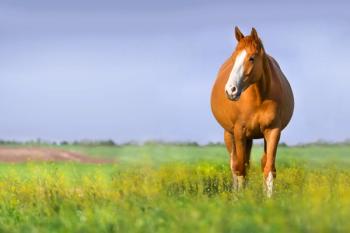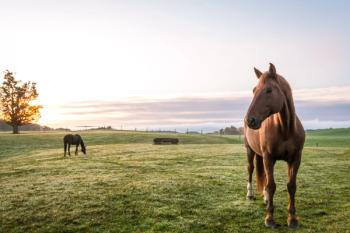
Two problems surface with wild-horse sanctuary offer
Reno, Nev. - An offer from Madeleine Pickens to create a million-acre sanctuary for wild horses could cost the Bureau of Land Management (BLM) more than it presently pays for long-term holding facilities for horses removed from public lands, according to the veterinary representative on the National Wild Horse and Burro Advisory Board.
RENO, NEV. — An offer from Madeleine Pickens to create a million-acre sanctuary for wild horses could cost the Bureau of Land Management (BLM) more than it presently pays for long-term holding facilities for horses removed from public lands, according to the veterinary representative on the National Wild Horse and Burro Advisory Board.
One of the problems with her proposal, says Boyd Spratling, DVM, of Starr Valley, Nev., is that Pickens is asking the government for a stipend of $500 per head, or roughly $15 million a year for 30,000 horses, to set up a nonprofit foundation to care for the horses.
"That's more than what the BLM already pays for wild horses in long-term care, mostly in Kansas and Oklahoma," says Spratling. The government pays landowners in those areas about $475 per head annually.
The stipend wasn't mentioned when Pickens, wife of Texas oil billionaire T. Boone Pickens, first extended her offer, but more recently she said, "You've got to get some kind of break from the government."
She estimated her plan could save the government as much as $700 million that otherwise would be spent on long-term holding facilities.
The cost of keeping horses in those facilities is estimated at $10.3 million for 2009, and those in short-term holding (awaiting adoptions) at about $22.6 million this year.
There's a second problem with the offer, too, says Ron Wenker, the BLM state director in Nevada. It's that some federal land she would like to use for part of the sanctuary cannot be used for that purpose, under the 1971 Free Roaming Horses and Burro Act.
That law restricts horses to acreage where herds roamed in 1971. But newly introduced House Bill 1018, if approved, would amend that law and possibly expand eligible grazing lands. Despite the two issues, the BLM remains open to talks with Pickens, Wenker says.
"We tried to thank her politely," he told the advisory board at its March meeting in Reno.
Also at that meeting, proposals to limit growth of the horse population, such as managing gender ratios in herds, were discussed.
The nine-member advisory panel board reappointed Spratling and two other members to new three-year terms.
Newsletter
From exam room tips to practice management insights, get trusted veterinary news delivered straight to your inbox—subscribe to dvm360.




